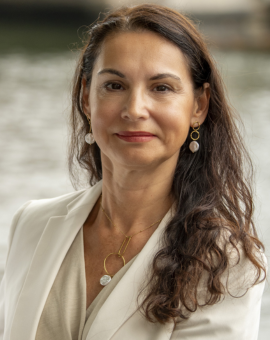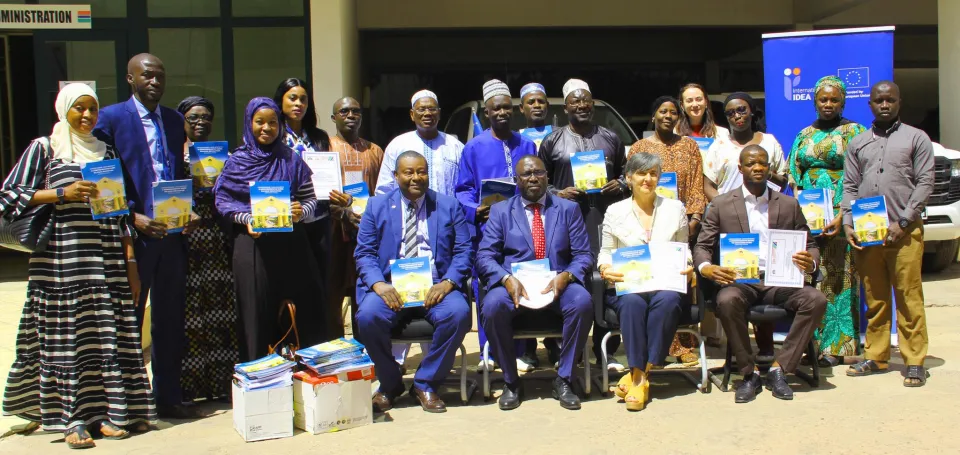Who’s defending democracy at the UN General Assembly? Unpacking the rhetoric and debunking myths
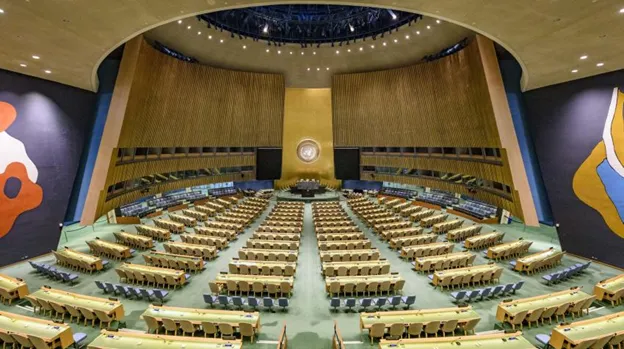
This week, like every September, heads of state are coming together at the UN General Assembly (UNGA) and address the world through their speeches during the High-Level Week (HLW) General Debate (GD). The HLW provides the United Nations’ 193 member states with a platform to present their official position on international politics, the state of the world, and their domestic and foreign policy priorities.
International IDEA’s latest “Global State of Democracy (GSoD) Report 2024: Strengthening the Legitimacy of Elections in a Time of Radical Uncertainty” finds that the global trend of democratic decline continued in 2023 for the eight consecutive year and that “challenges to democracy are found in every part of the world, and at every level of democratic performance”.
International IDEA’s forthcoming report on “Who’s Defending Democracy? Unpacking the Rhetoric at the UN General Assembly” looks at the extent to which the global democratic trends observed in the GSoD report are reflected in country statements at UNGA high-level week general debates, how countries frame their democracy discourse and whether this framing has evolved since 2015 (which marks the adoption of the 2030 Agenda for Sustainable Development.
A few highlights and key findings from the report show that democracy has been a salient theme in HLW GD speeches for the past nine years (2015-2023).1 During this period, almost all countries (95%), with the exception of eight, refer to democracy in some form2 as do more than half (55%) of the statements.
Democracy references were highest in 2018 and 2021, and lowest during the pandemic year of 2020 and have been on the decrease since 2021.
Figure 1: Total number of democracy mentions per year 2015-2023 (in number of words)
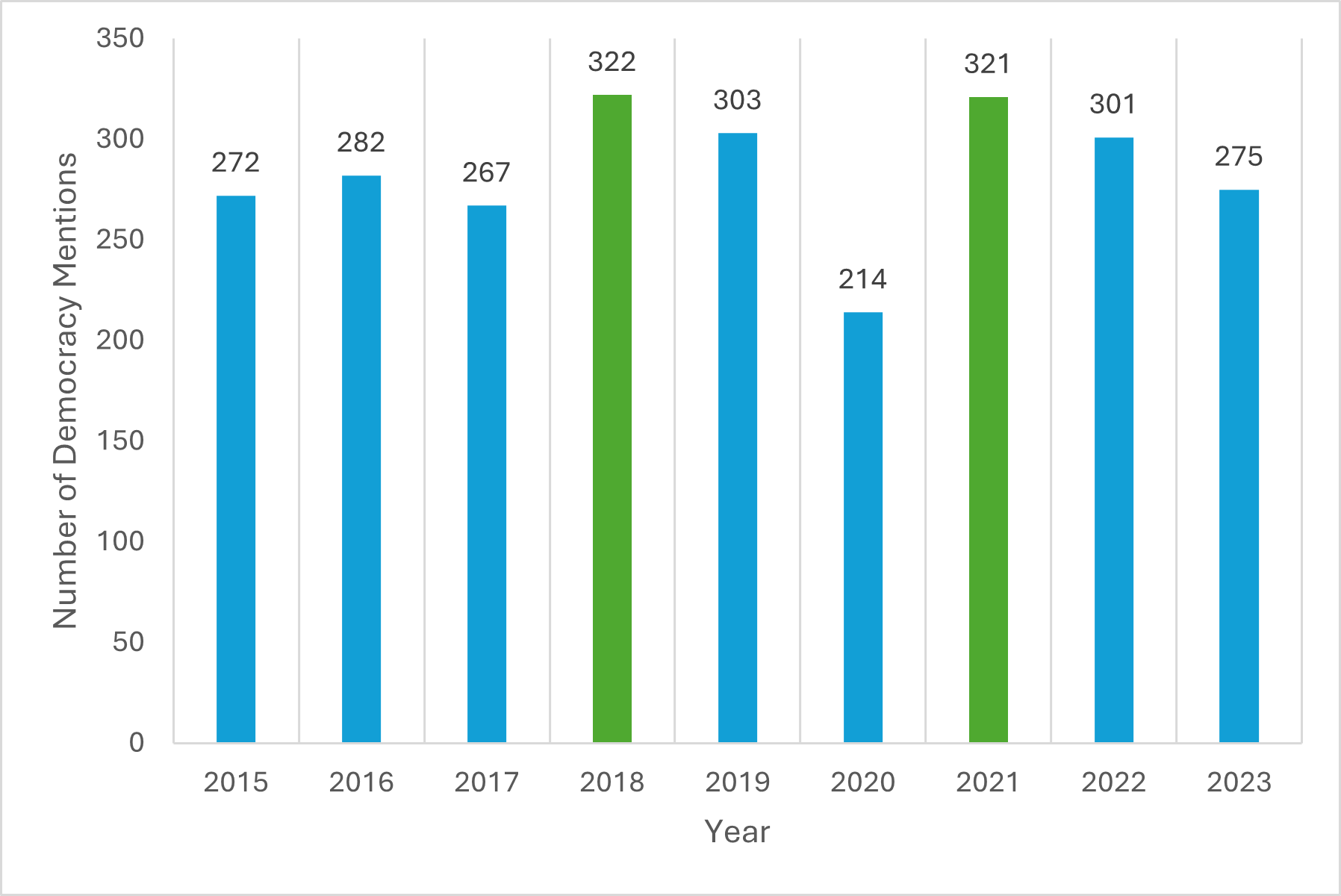
More than half the countries in the world referred to democracy in their speeches each year, except in 2019 and the pandemic year of 2020.
Figure 2: Percentage of total countries mentioning democracy per year
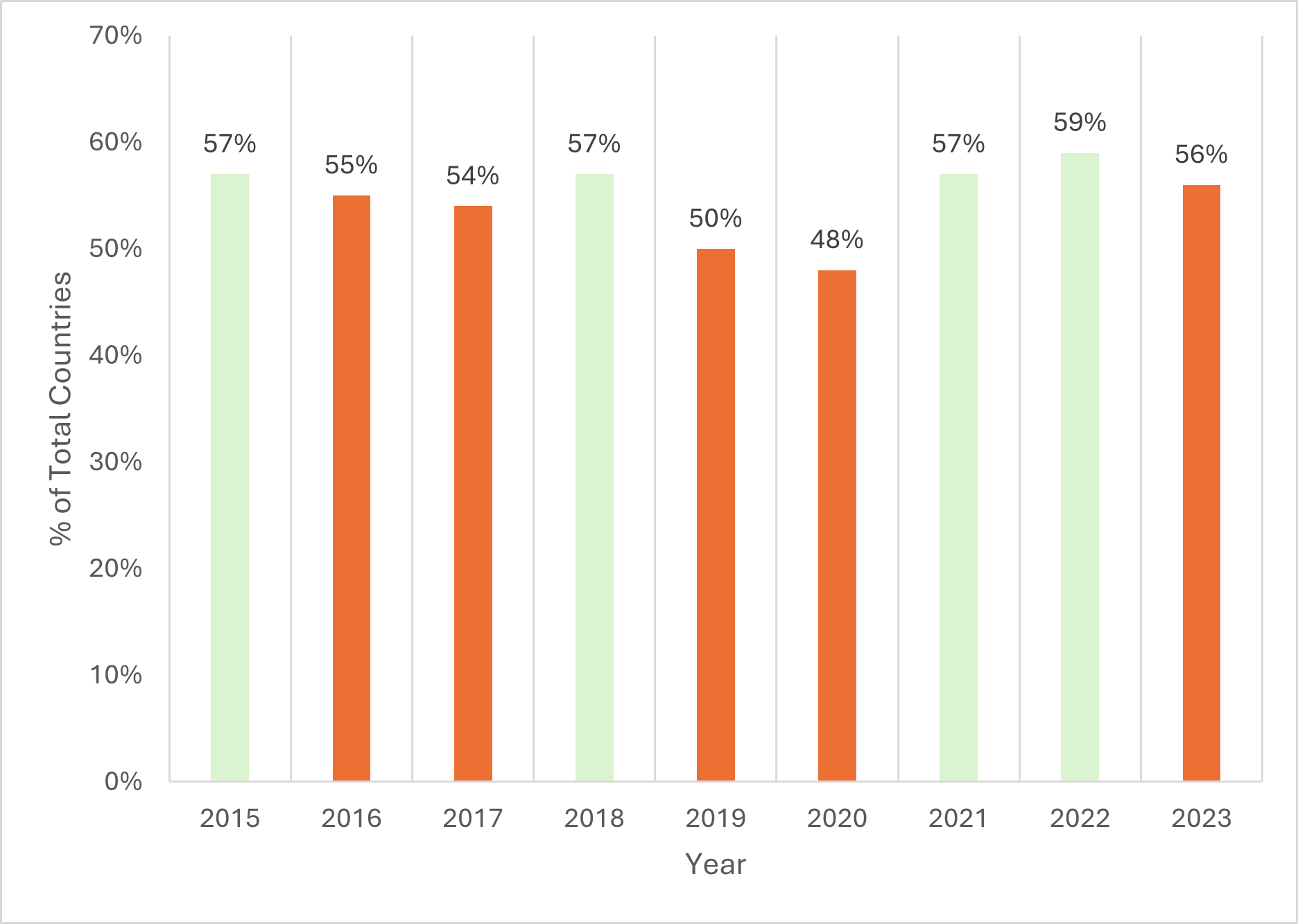
Democracy was also a relatively salient issue compared to others, ranking as the 27th most mentioned issue out of 100 over the 2015-2023 period, after development, security, peace, climate and rights among other issues.
Figure 3: Wordcloud of key issues in UNGA High-Level Week General Debate Statements 2015-2023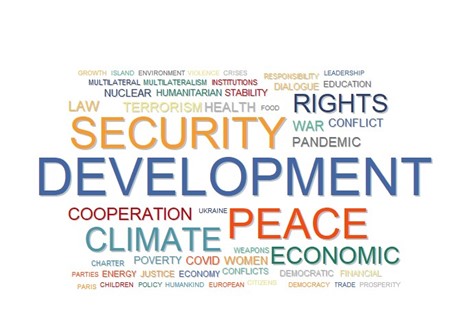
The study debunks the myth that democracy is a Western concept imposed by the “Global North”, with Africa being the region with the most references to democracy (692 mentions – all African countries made at least one mention of democracy during the nine-year period) ahead of Europe (all countries except Hungary mentioned democracy at least once). Moreover, Latin America and the Caribbean had the largest number of average mentions of democracy by country after North America3 (while Africa and Europe were on a par (Figure 4). The Middle East, however - the least democratic region in the world - came out last on both counts.
Figure 4: Total number of democracy mentions and average number of democracy mentions by country per region 2015-2023
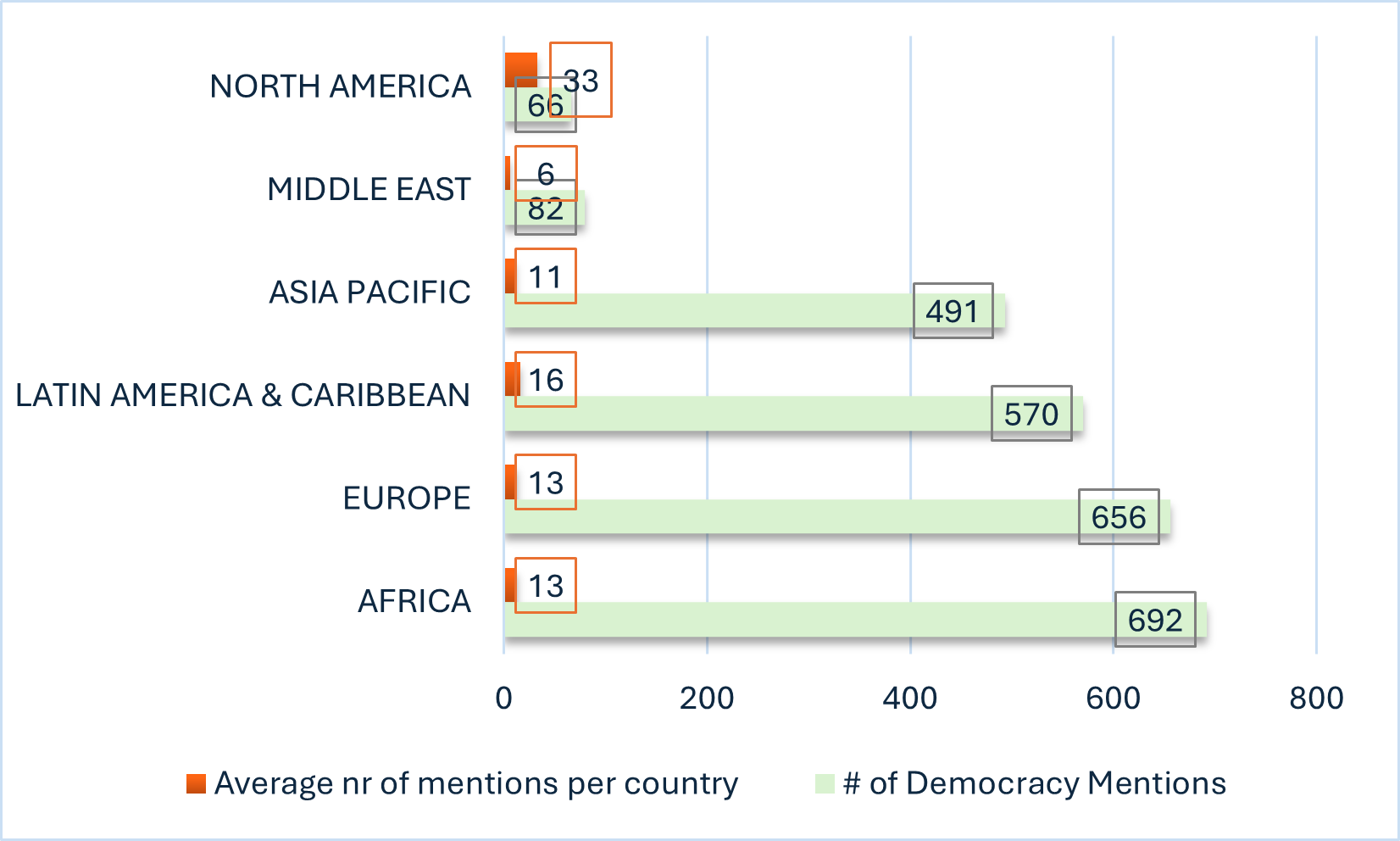
Only eight countries in the world made no single mention of democracy between 2015 and 2023. Half of those were in the Middle East (Saudi Arabia, Qatar, Oman and United Arab Emirates), three in Asia and the Pacific (Kiribati, Singapore and Turkmenistan) and one in Europe (Hungary). Of those, only Kiribati is considered to be a “free” country by Freedom House, while Singapore and Hungary are listed as “partly free”. Hungary, a country that has been democratically backsliding for over a decade, is the only EU country that has not referenced democracy in its statements.
Figure 5: Number of countries per region that mentioned democracy at least once (blue) and number of countries that never mentioned democracy (red) per region from 2015-2023
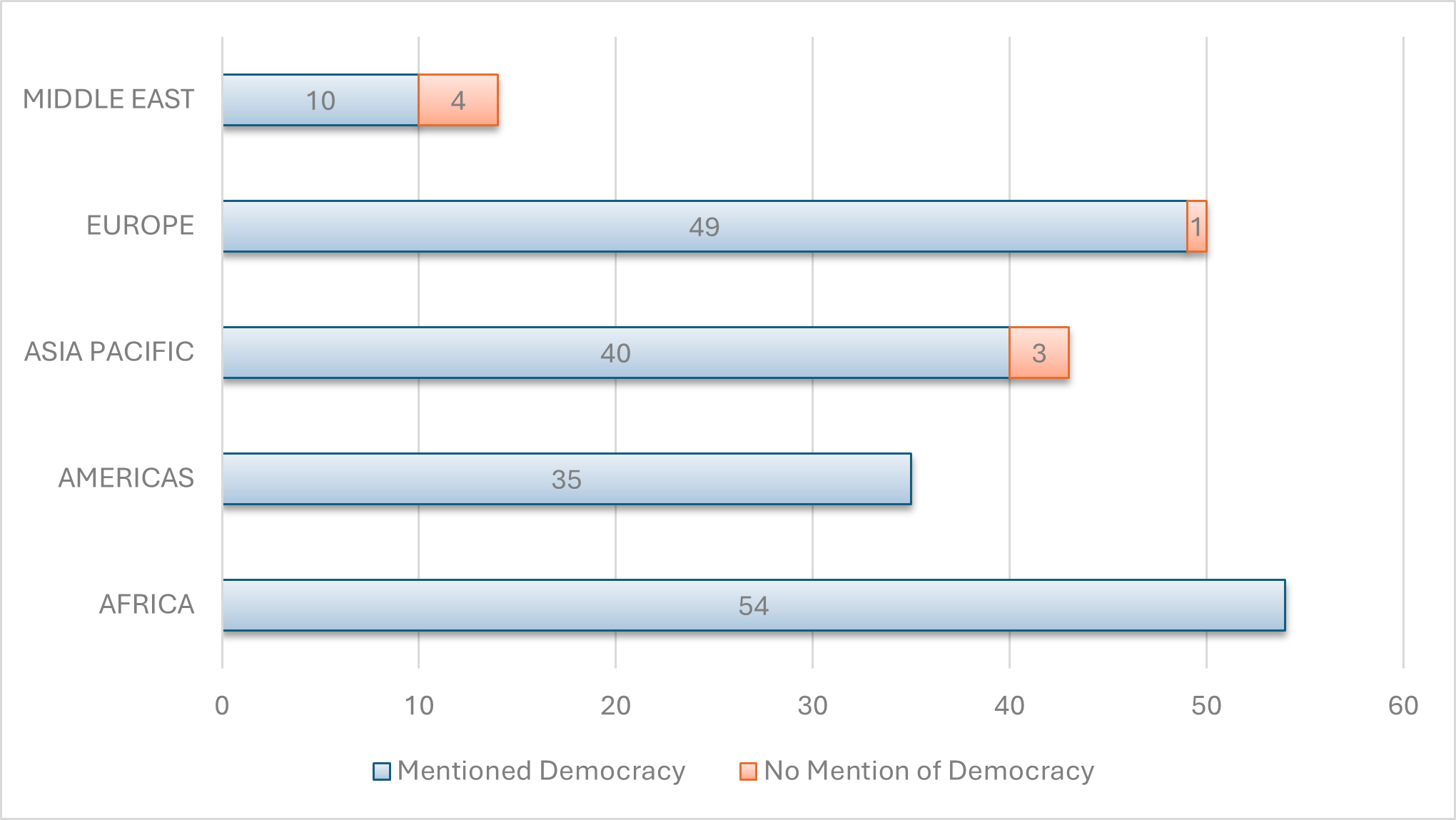
The debunking of the Western framing of democracy was also apparent when looking at the UN member states that most frequently mentioned democracy. Chile was the country that made most mentions of democracy, followed by the United States. Others that came out in the top mentions included countries such as Nepal, Peru, Liberia, Ghana, Mongolia, and The Gambia. Of the 101 countries that mentioned democracy most frequently (10 mentions or more), more than two thirds (70%) are from the G77+China group of developing countries, with Chile topping the list. Only 13 of the top 101 countries mentioning democracy are OECD countries.
Figure 6: Countries with most democracy mentions 2015-2023
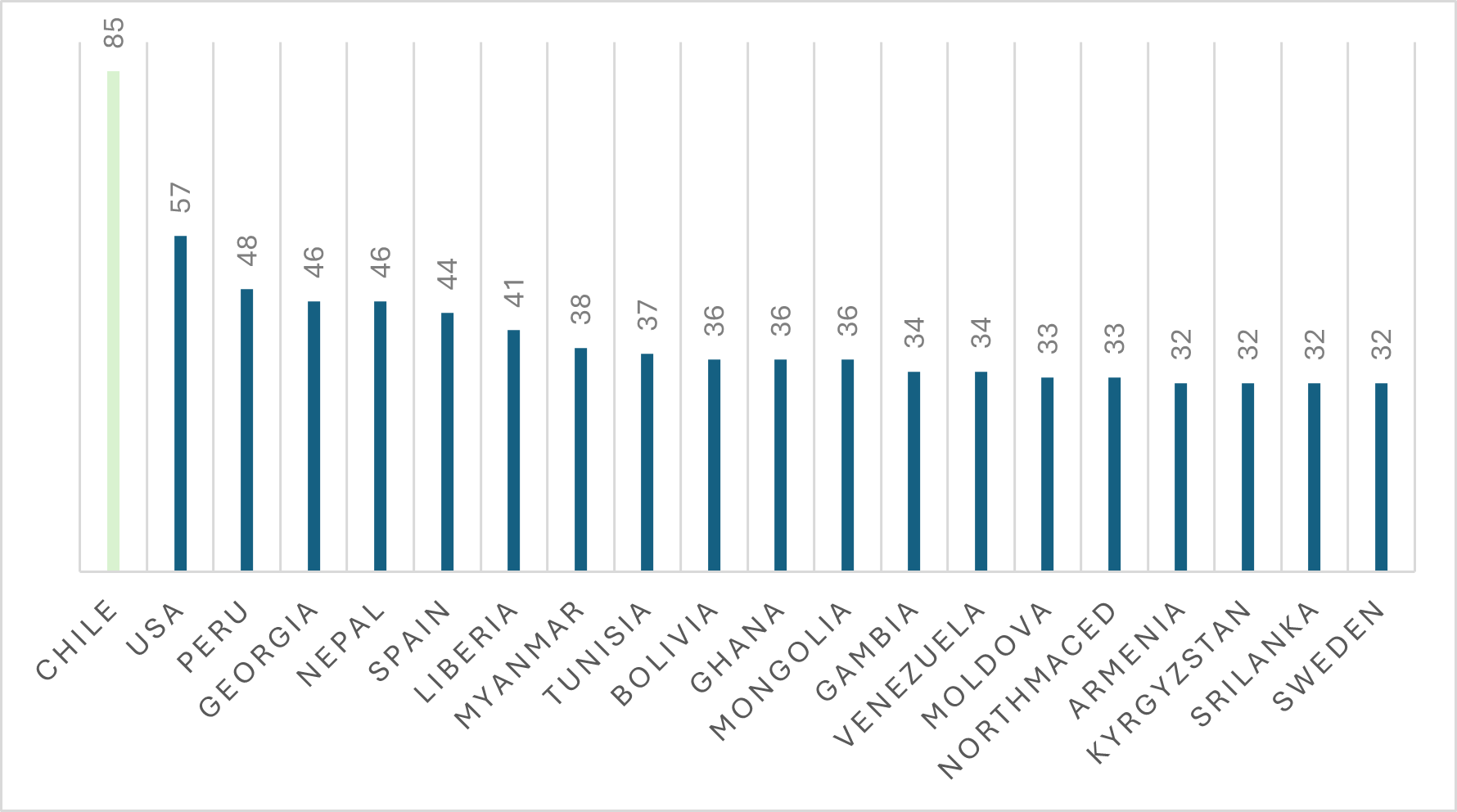
Member States with a democratic system of governance tended to mention democracy more. Forty-one per cent of countries who mentioned democracy at least 10 times were free countries according to Freedom House’s classification, and 21 per cent had high levels of democratic performance according to International IDEA’s GSoD Indices. Thirty-five per cent of the countries were partly free, and more than half of them (54%) had mid-range levels of democratic performance according to International IDEA’s GSoD Indices. However, a quarter (25%) of countries mentioning democracy frequently were non-free countries. These included for example Venezuela, Russia, Cambodia, Cuba, Belarus, China and Iran.
Many free or partly free countries, including mid-to-high level democracies, were newer or recent democracies facing challenges like attempted coups, mass protests, threats to electoral integrity, political rights, and shrinking civic space, highlighting their democratic fragility. Only seven out of 101 countries with the top mentions were older democracies (countries that were democracies before 1970): the United States, Italy, Sweden, Belgium, Germany, France and the United Kingdom.
Figure 7: Percentage of countries that mentioned ‘Democracy’ at least 10 times in their UNGA statements between 2015-2023, according to Freedom House’s classification & International IDEA’s GSoD Indices
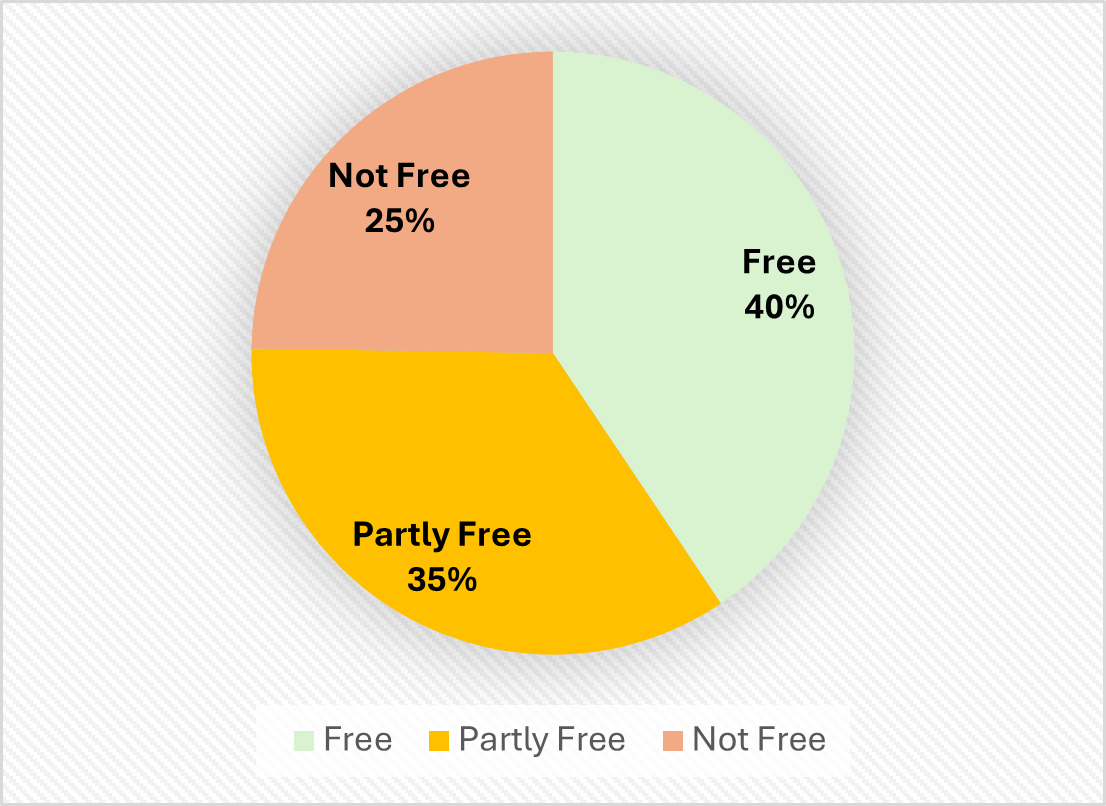
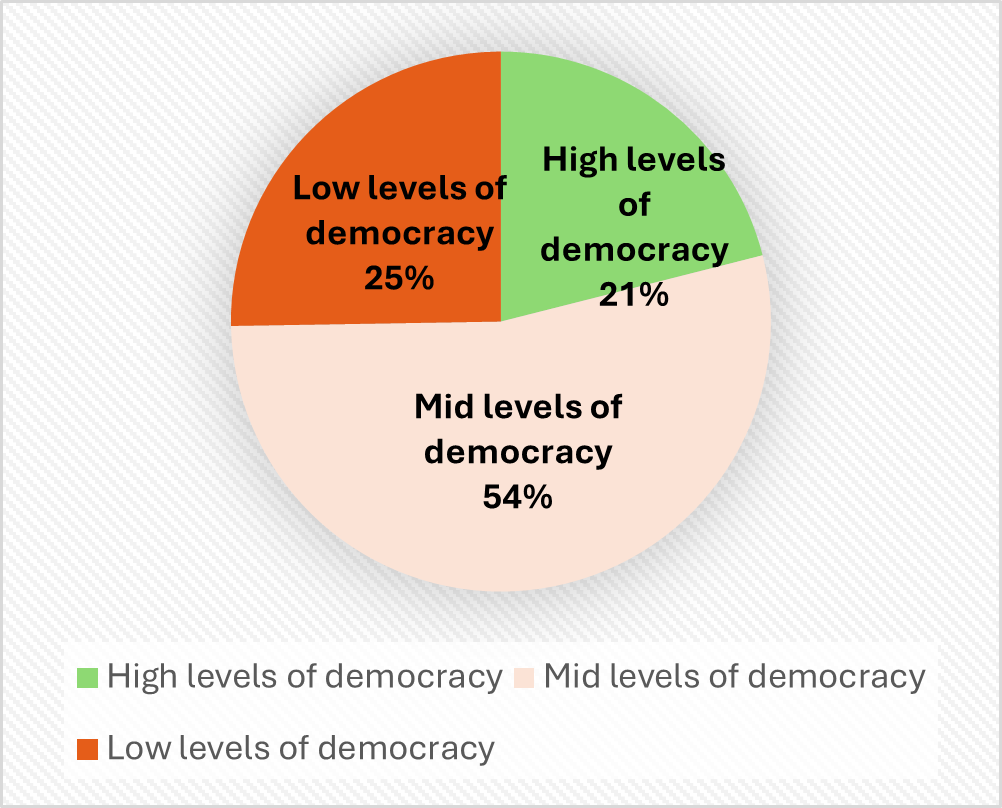
Table 1: Number of ‘Democracy’ mentions by age of democracy (before or after 1970 or recent transitions)
| Older democracies (established before 1970) | Newer democracies (established after 1970) |
Countries with democratic transitions or coups (in the last 10 years) or post-conflict countries |
| United States of America 57 Sweden 32 Belgium 21 United Kingdom 16 Germany 14 France 13 Italy 12 |
Chile 85 Peru 48 Georgia 46 Nepal 46 Ghana 36 Mongolia 36 Moldova 33 North Macedonia 33 Bosnia and Herzegovina 27 Paraguay 27 Brazil 24 Argentina 22 Uruguay 21 Ecuador 20 Philippines 20 Latvia 19 Timor Leste 18 Kenya 17 Nigeria 17 Estonia 16 Mexico 16 South Africa 13 Panama 12 Tanzania 12 Croatia 11 Czech Republic 11 Mauritius 11 Botswana 10 Indonesia 10 |
Myanmar4 38 Tunisia 37 Bolivia 36 The Gambia 34 Armenia 32 Sri Lanka 32 Colombia 27 Sierra Leone 26 Fiji 24 Colombia 20 Madagascar 16 Zambia 16 Côte d’Ivoire 10 Honduras 10 Solomon Islands 10 |
Beyond the numbers, the way countries frame their democracy discourse in UN speeches varies, although some patterns also emerge:
Of the 2,557 references to democracy made by countries since 2015, the large majority (82%) referred to democracy as a system of government and a set of values in positive terms.
Fourteen per cent of references were framed negatively, focusing on threats to democracy in different parts of the world. Four per cent of the references did not describe democracy as a national system of government. Instead, they focused on democracy in the context of international governance, emphasizing the need to make global institutions, especially the UN Security Council, more democratic and representative of all countries. While these arguments generally came from the G77+ China group of developing countries--and constituted a central piece of the democracy framing of autocracies such as Venezuela, China, Iran, Belarus and Russia--two OECD countries also emphasized the importance of democratizing the UN system (Italy and Spain).
Figure 8: How democracy is being references at the UNGA debates since 2015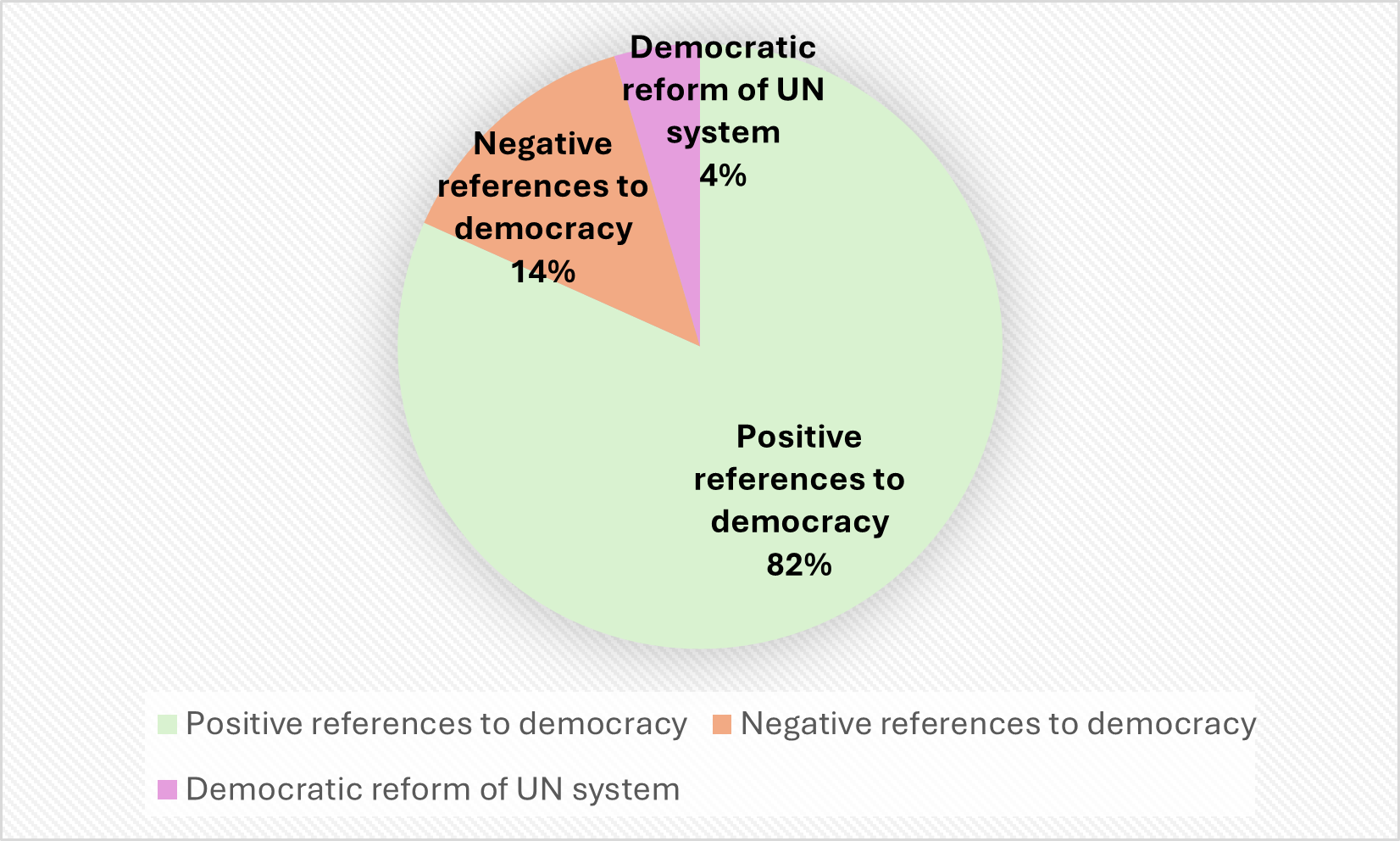
Positive references to democracy
- A number of countries proudly described themselves as democracies. This included a diverse group of newer and older democracies such as Argentina, Antigua, Albania, South Korea, Barbados, Belize, Brazil, Comoros, Costa Rica, Ghana, Indonesia, India, Liberia, Philippines and Fiji as well as Israel, Spain and Australia. Australia, St Vincent and the Grenadines, the Czech Republic, Cabo Verde and Israel emphasized the “liberal” dimension of their democratic systems. Some non-democracies also depicted themselves as democracies, i.e. Bangladesh, Iran, and Eswatini (emphasizing its “unique model of democracy”).
- Countries also affirmed the importance of democratic values and their commitment to democratic principles (Cabo Verde, Germany, and the EU), the commitment to strengthen their democracy (Argentina, Colombia, Guyana and Indonesia), and to consolidate it (Albania, Angola, Armenia and The Gambia).
- A number of countries also expressed their commitment to strengthen democracy in their region or beyond (Ireland, Liberia and Australia).
- A number of countries emphasized that democracy is a better system of government to achieve justice, equality and sustainable development (Afghanistan--before the Taliban takeover, Albania, Belgium, Bosnia and Herzegovina, Dominican Republic, Ghana, Australia, Iceland, Israel and Cabo Verde); and peace (Estonia, France, Italy).
- Angola, Armenia and Guyana emphasized the importance of free and fair elections for democracy, while Andorra and Mongolia emphasized the need to invest in democracy education.
- A number of countries celebrated the restoration of democracy, either recent transitions or decades-long transition anniversaries, pointing to the need to continuously work to protect and nurture democracy (Argentina, Spain and Chile).
- Countries like Ecuador and Romania emphasized the importance of generating and promoting spaces for young people to participate in politics and gender equality as a key pillar of democracy (Argentina, Australia, Bulgaria, Canada, Costa Rica, Indonesia and Estonia), while others emphasized the importance of free media (Estonia, UK) and the link between climate change and democracy (Antigua).
- A number of countries made reference to the role of the multilateral system in protecting and strengthening democracy (Chile, Colombia, France and Liberia), emphasizing the role of regional organizations (France), and global agreements to strengthen democracy (Argentina) and the importance of shared democratic values as basis for cooperation (Belize and Taiwan).
Negative references to democracy
Although significantly less, a number of countries also expressed concerns about challenges to democracy.
- A number of countries expressed concerns about democratic decline globally (Andorra, Costa Rica, Iceland, Colombia and Sweden) and increasing threats to democracy (Colombia).
- Threats described included coups; the rise of populism (Andorra, Chile, Iceland and North Macedonia), terrorism (Afghanistan, Congo DRC, France, Guinea and Nepal); illegal migration (Albania); organized crime (Albania); corruption (Colombia, Moldova, Peru, Sweden); attacks on women and girls (Costa Rica); political extremism (Estonia, Spain); disinformation (EU, Liechtenstein, North Macedonia, New Zealand and Moldova); cyber and hybrid threats (Czech Republic and Estonia); declining support for democracy (Mexico); social exclusion (Andorra); and conflict (Armenia), among others.
- Concerns were also expressed by many countries about the rise of authoritarianism and the need to restore democracy in places such as Haiti, Venezuela, and Belarus.
- The fragility of democracy and the need to protect it was also mentioned, mainly by third wave democracies such as Chile; or countries with democratic aspirations such as Congo DRC.
- Several countries mentioned the importance of democracy assistance to strengthen their democracies (Afghanistan - before the Taliban takeover, Armenia, Liberia and Solomon Islands).
- Some countries highlighted the importance of recognizing different forms of democracy (Eswatini) and emphasized that there is ‘no one size fits all’ democracy (Ghana and USA); the danger of imposing democracy from the outside (Angola, Belarus and São Tomé and Príncipe) and the right to sovereignty (Iran) and the hypocrisy of democracy (Iran and Cambodia).
- Concerns were expressed by countries such as China that democracy creates divisions and is used as a “weapon to achieve political ends.”
- Countries also emphasized the importance of ensuring that new digital technologies, including AI, be guided by democratic principles (Argentina, Belgium, Bulgaria, Denmark, India and the Philippines).
- A number of countries also emphasized the importance of democratic development going hand in hand with economic development, although countries such as Cuba argued that capitalism undermines democracy.
In sum, the analysis of UN General Assembly speeches from 2015 to 2023 reveals that democracy is a central theme in global discourse, mentioned by more than three-quarters of the world's countries in HLW general debates since 2015 by countries from all regions and with all levels of democratic maturity. Despite the global trend of democratic decline, many nations—particularly in Africa, Latin America, and the Caribbean—emphasize democracy and its value in their addresses. The study debunks the notion that democracy is solely a Western concept, with “global majority” countries leading in the democratic discourse. However, concerns about threats to democracy, such as authoritarianism, corruption, and disinformation, were also highlighted across all regions.
[1] A total of 1727 statements between 2015 and 2023 were reviewed. This also included statements in French and Spanish. Arabic, Russian and Chinese statements were translated into English. All the keyword searches were done in three languages (English, French, Spanish).
[2] Using keyword searches on democracy and derivatives in 3 languages (English, Spanish, French).
[3] The regional classification used is the one used by International IDEA’s Global State of Democracy Indices.
[4] Myanmar has not made any statements during the General Debate of High-Level week since the 2021 military coup.
Acknowledgements: This article was written by Annika Silva-Leander and reviewed by Amanda Sourek and Nathalie Ebead. Alexander Mayer conducted the quantitative analysis and generated the graphs and Chandi Haripriya Guduru provided inputs on the qualitative analysis.
